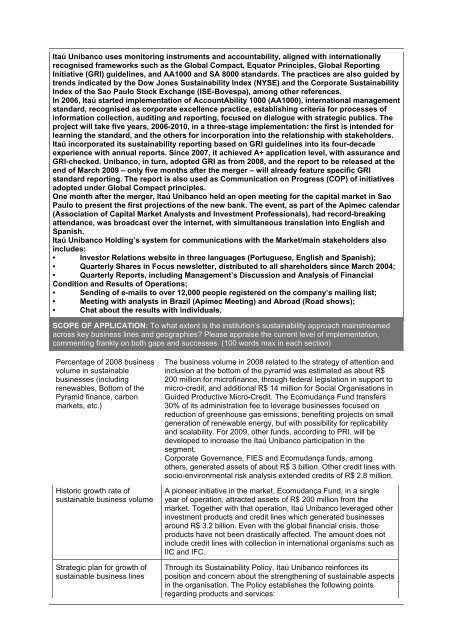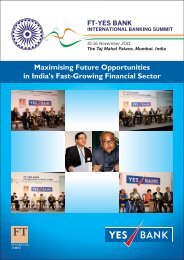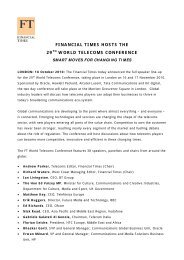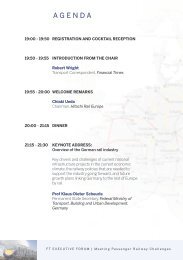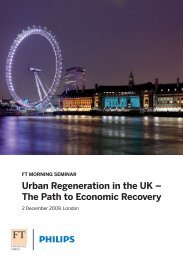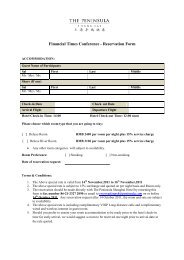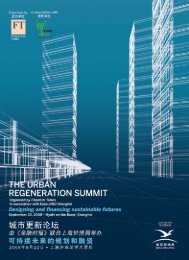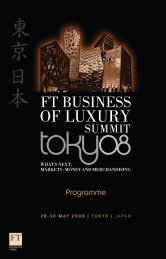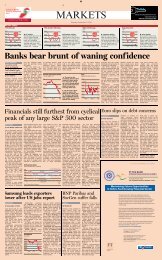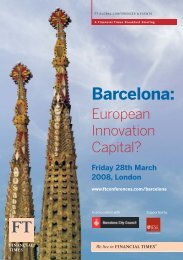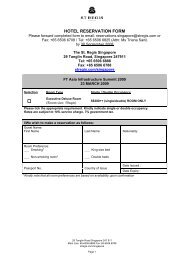FT SUSTAINABLE BANKING AWARDS 2009 Emerging Markets ...
FT SUSTAINABLE BANKING AWARDS 2009 Emerging Markets ...
FT SUSTAINABLE BANKING AWARDS 2009 Emerging Markets ...
You also want an ePaper? Increase the reach of your titles
YUMPU automatically turns print PDFs into web optimized ePapers that Google loves.
Itaú Unibanco uses monitoring instruments and accountability, aligned with internationally<br />
recognised frameworks such as the Global Compact, Equator Principles, Global Reporting<br />
Initiative (GRI) guidelines, and AA1000 and SA 8000 standards. The practices are also guided by<br />
trends indicated by the Dow Jones Sustainability Index (NYSE) and the Corporate Sustainability<br />
Index of the Sao Paulo Stock Exchange (ISE-Bovespa), among other references.<br />
In 2006, Itaú started implementation of AccountAbility 1000 (AA1000), international management<br />
standard, recognised as corporate excellence practice, establishing criteria for processes of<br />
information collection, auditing and reporting, focused on dialogue with strategic publics. The<br />
project will take five years, 2006-2010, in a three-stage implementation: the first is intended for<br />
learning the standard, and the others for incorporation into the relationship with stakeholders.<br />
Itaú incorporated its sustainability reporting based on GRI guidelines into its four-decade<br />
experience with annual reports. Since 2007, it achieved A+ application level, with assurance and<br />
GRI-checked. Unibanco, in turn, adopted GRI as from 2008, and the report to be released at the<br />
end of March <strong>2009</strong> – only five months after the merger – will already feature specific GRI<br />
standard reporting. The report is also used as Communication on Progress (COP) of initiatives<br />
adopted under Global Compact principles.<br />
One month after the merger, Itaú Unibanco held an open meeting for the capital market in Sao<br />
Paulo to present the first projections of the new bank. The event, as part of the Apimec calendar<br />
(Association of Capital Market Analysts and Investment Professionals), had record-breaking<br />
attendance, was broadcast over the internet, with simultaneous translation into English and<br />
Spanish.<br />
Itaú Unibanco Holding’s system for communications with the Market/main stakeholders also<br />
includes:<br />
• Investor Relations website in three languages (Portuguese, English and Spanish);<br />
• Quarterly Shares in Focus newsletter, distributed to all shareholders since March 2004;<br />
• Quarterly Reports, including Management’s Discussion and Analysis of Financial<br />
Condition and Results of Operations;<br />
• Sending of e-mails to over 12,000 people registered on the company’s mailing list;<br />
• Meeting with analysts in Brazil (Apimec Meeting) and Abroad (Road shows);<br />
• Chat about the results with individuals.<br />
SCOPE OF APPLICATION: To what extent is the institution’s sustainability approach mainstreamed<br />
across key business lines and geographies? Please appraise the current level of implementation,<br />
commenting frankly on both gaps and successes. (100 words max in each section)<br />
Percentage of 2008 business<br />
volume in sustainable<br />
businesses (including<br />
renewables, Bottom of the<br />
Pyramid finance, carbon<br />
markets, etc.)<br />
Historic growth rate of<br />
sustainable business volume<br />
Strategic plan for growth of<br />
sustainable business lines<br />
The business volume in 2008 related to the strategy of attention and<br />
inclusion at the bottom of the pyramid was estimated as about R$<br />
200 million for microfinance, through federal legislation in support to<br />
micro-credit, and additional R$ 14 million for Social Organisations in<br />
Guided Productive Micro-Credit. The Ecomudança Fund transfers<br />
30% of its administration fee to leverage businesses focused on<br />
reduction of greenhouse gas emissions, benefiting projects on small<br />
generation of renewable energy, but with possibility for replicability<br />
and scalability. For <strong>2009</strong>, other funds, according to PRI, will be<br />
developed to increase the Itaú Unibanco participation in the<br />
segment.<br />
Corporate Governance, FIES and Ecomudança funds, among<br />
others, generated assets of about R$ 3 billion. Other credit lines with<br />
socio-environmental risk analysis extended credits of R$ 2.8 million.<br />
A pioneer initiative in the market, Ecomudança Fund, in a single<br />
year of operation, attracted assets of R$ 200 million from the<br />
market. Together with that operation, Itaú Unibanco leveraged other<br />
investment products and credit lines which generated businesses<br />
around R$ 3.2 billion. Even with the global financial crisis, those<br />
products have not been drastically affected. The amount does not<br />
include credit lines with collection in international organisms such as<br />
IIC and IFC.<br />
Through its Sustainability Policy, Itaú Unibanco reinforces its<br />
position and concern about the strengthening of sustainable aspects<br />
in the organisation. The Policy establishes the following points<br />
regarding products and services:


